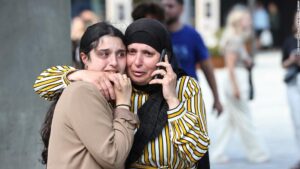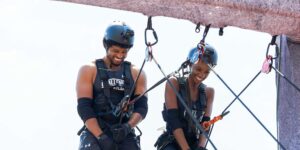Hidetada Fukushima, head of the emergency center at the Nara Medical University Hospital, said Abe had no vital signs when he arrived there at 12:20 p.m. Friday. Doctors found two gunshot wounds to the neck, and one of the bullets had reached the heart, Fukushima said. Despite efforts to save him, including a transfusion, Abe died of blood loss less than five hours later.
The assassination of Japan’s longest-serving prime minister, and a staunch U.S. ally, sent shock waves throughout the country ahead of elections for the upper house of parliament on Sunday.
Police arrested a suspect, a man from Nara in his 40s named Tetsuya Yamagami, and seized a gun. Yamagami was a member of the Japan Maritime Self Defense Forces for three years, defense officials told Japanese media.
Footage of the event showed Abe giving a speech, then a plume of smoke forming behind him as he collapsed. Officials ran to apprehend the shooter, who appeared to be positioned behind Abe. Videos showed a chaotic scene with Abe, unmoving, lying on the ground as attendees yelled for an ambulance. The bullet wounds were found in the front of Abe’s body, Fukushima said.
Abe, who came from a prominent political family, was the youngest person to become prime minister of postwar Japan. His popularity soared after he resigned from office in 2020, and he remained a power-broker who frequented campaign events to support other LDP politicians.
At an emotional news conference after Abe’s death, Prime Minister Fumio Kishida praised his former colleague as “a dear friend who loved this country.”
“To lose such a figure in this manner is absolutely devastating,” he said.
Kishida said Sunday’s upper house election would continue as planned, but with enhanced safety measures, saying it was important to protect the democratic process and not allow violence to change its course.
“Elections are the foundation of democracy, which we must defend. We cannot give in to violence. For this reason, we will continue to fight the election campaign until the very end. I hope the people of Japan will think about and work hard to protect this democracy,” Kishida said.
Earlier, appearing close to tears, the prime minister described the attack as a “despicable and barbaric act.”
Japanese media reported that the suspect had told police that he was frustrated with Abe and aimed at the former conservative leader with the intent to kill him.
Abe oversaw a period of relative stability as prime minister from 2012 to 2020, raising Japan’s global image and emphasizing a strong alliance with the United States, even as former U.S. president Donald Trump tested long-standing relationships with allies. The pair forged a close relationship and often played golf together.
Abe focused on reviving Japan’s stagnating economy through a package dubbed “Abenomics,” and sought to expand Japan’s military defenses. Controversially, he tried to modify the country’s pacifist postwar constitution; even after leaving office he continued to push for Japan to increase its defensive capabilities, most recently suggesting Japan should discuss a nuclear “sharing” program similar to NATO members after Russia’s invasion of Ukraine.
Earlier, he led the country from 2006 to 2007 but stepped down because of chronic ulcerative colitis, the same condition that led to his resignation in 2020.
Foreign leaders expressed sympathies as they reacted with horror to the events in Nara.
In a statement before Abe’s death, the White House said it was “shocked and saddened to hear about the violent attack.” “We are closely monitoring the reports and keeping our thoughts with his family and the people of Japan,” it said.
China’s Foreign Ministry extended condolences to his family. Taiwanese President Tsai Ing-wen said Abe was “not only my good friend, but also Taiwan’s most staunch friend.” British Prime Minister Boris Johnson said he was “utterly appalled and saddened.” Indian leader Narendra Modi said he was “deeply distressed.” The Kremlin said it “strongly condemned” the attack on “a patriot who defended Tokyo’s interests.”
There has not been an attack against a Japanese politician in many years. In 2007, Nagasaki mayor Ito Itcho died after a gunman shot him. Prior to that was in 1994, when a gunman shot Prime Minister Hosokawa Morihiro at a hotel, but he was unharmed.
Kishida, who was campaigning in Yamagata when the shooting occurred, canceled his campaign schedule Friday and headed back to Tokyo.
Firearms are strictly regulated in Japan, and gun violence is most often associated with the yakuza, the Japanese criminal network. Last year, eight of the 10 shootings in Japan were related to the yakuza, according to the National Police Agency, resulting in one death and four injuries.
Anyone trying to obtain a gun in Japan needs to apply for a permit, attend a class on gun safety and laws, and pass a written test. There is a full-day training course on safe shooting and practicing techniques. There are multiple rounds of checks and verification on the gun owner’s background and health, including information about their family, mental health, personal debt, and criminal record. The gun must be registered with and inspected by police.



